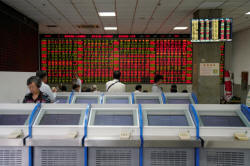Stocks stall, oil cools, Evergrande and lira fall
 Send a link to a friend
Send a link to a friend
 [October 21, 2021] By
Marc Jones [October 21, 2021] By
Marc Jones
LONDON (Reuters) - World stocks slipped on
Thursday as the upbeat mood that carried the Dow Jones and bitcoin to
records a day earlier ran out of steam, while a pause in the oil rally
stalled rising global bond yields.
Turkey's lira was backsliding towards record lows with the central bank
expected to chop its interest rates again later and China Evergrande was
back in the firing line after it had been forced to abandon a $2.6
billion stake.
Other risk and commodity sensitive currencies such as the Australian and
New Zealand dollars and South African rand also hit a speed bump, giving
the safe-haven Japanese yen a rare lift after it had fallen to a
four-year low versus the dollar. [/FRX]
"There is little bit of risk aversion," said Societe Generale's Kit
Juckes, who pointed to the higher yen and the fact that both European
stocks and Wall Street S&P 500 futures were both in the red.
"I think most people today are going to be looking at the Turkey central
bank meeting to see if sparks are going to fly... other than that the
themes (of rising inflation and COVID cases) are pretty much set".
Commodities also eased, with Brent crude futures down 0.2% after
touching a three-year top and Chinese coal futures extending a sharp
pullback after Beijing had signalled it would intervene to cool prices.

"The U.S. stock market has gone up for six days in a row, bitcoin's made
a record and the U.S. bond market is calm. On the surface it looks
benign," said Andrew Ticehurst, a rates strategist at Nomura in Sydney.
"But below the surface we are uncomfortable about a number of things,"
he added, chiefly the slowdown in China's economy seen in data earlier
this week and concerns about potential fallout from Evergrande's
troubles.
Evergrande will default on $19 billion of international market bonds if
it doesn't make an already overdue coupon payment by Monday. It would
the biggest ever Chinese default and one the world's largest too. Lehman
Brothers' collapse added up to $35 billion.
Late on Wednesday, Evergrande confirmed its plans to sell a $2.6 billion
stake in its property services unit had fallen through. Its shares ended
down 11.5% in Hong Kong on Thursday, although it wasn't all bad news.
Financial news provider REDD reported that it had secured an extension
on one of its lower-profile bonds.
Shares in rival Chinese developers also drew support after reassurances
from a number of top Chinese officials that the trouble in the sector
would not be allowed to escalate into a full-blown crisis, but global
investors remain nervous. [.SS]
TALKING TURKEY
Turkey's lira dropped 0.7% against the dollar and was the worst
performer in FX markets as bamboozled traders expected the central bank
to once again fly in the face of economic orthodoxy and cut its 18%
interest rates.
[to top of second column] |

People look at an electronic board showing stock information at a
brokerage house in Shanghai, China July 6, 2018. REUTERS/Aly Song

It did so last month and the lira has hit a string of record lows in recent
sessions after another major ousting of central bank policymakers last week left
investors doubting the bank's independence from the government.
"We have seen strong outflows from debt in the last three weeks, probably due to
uncertainty with the currency and increased risk perception," IIF economist
Jonathan Fortun told Reuters.
Wall Street futures were down 0.3% after a blizzard of earnings had helped the
Dow Jones touch an all-time high on Wednesday, with the S&P 500 within touching
distance too.
The VIX volatility index, sometimes referred to as Wall Street's "fear gauge",
also ticked up having dropped to a two-month low the previous day.
But a soft finish on the Nasdaq flowed through to tech-stock selling in Tokyo
and in Hong Kong, where the Hang Seng fell 0.8%.
In the government bond markets that drive global borrowing costs, longer-dated
U.S. Treasury yields steadied after rising with inflation and growth
expectations on Wednesday.
The benchmark 10-year yield hovered at 1.6568%, just below the previous day's
five-month high of 1.6730%, while Germany's 10-year yield, the benchmark for
Europe, was unmoved at a still negative -0.12%.
"The strong focus on the volatile (bond) curve environment in the euro area
looks set to stay, at least until next week's ECB Governing Council meeting,"
UniCredit analysts told clients.
Investors have figured that surging energy prices and tightening job markets
will pressure top central banks such as the U.S. Fed and ECB to either raise
interest rates or at least rein in stimulus.
Fed funds futures have priced a 25 basis point U.S. rate hike in the third
quarter of 2022 while eurodollar markets expect higher rates as soon as the
second quarter.
"In our view, the dollar and yen face upside risks if inflation concerns spark a
sharp tightening in global short-term interest rates and a sharp pullback in
equity markets," said Commonwealth Bank of Australia currency analyst Carol
Kong.

(Additional reporting by Tom Westbrook in Singapore; Editing by Alex Richardson)
[© 2021 Thomson Reuters. All rights
reserved.] Copyright 2021 Reuters. All rights reserved. This material may not be published,
broadcast, rewritten or redistributed.
Thompson Reuters is solely responsible for this content. |